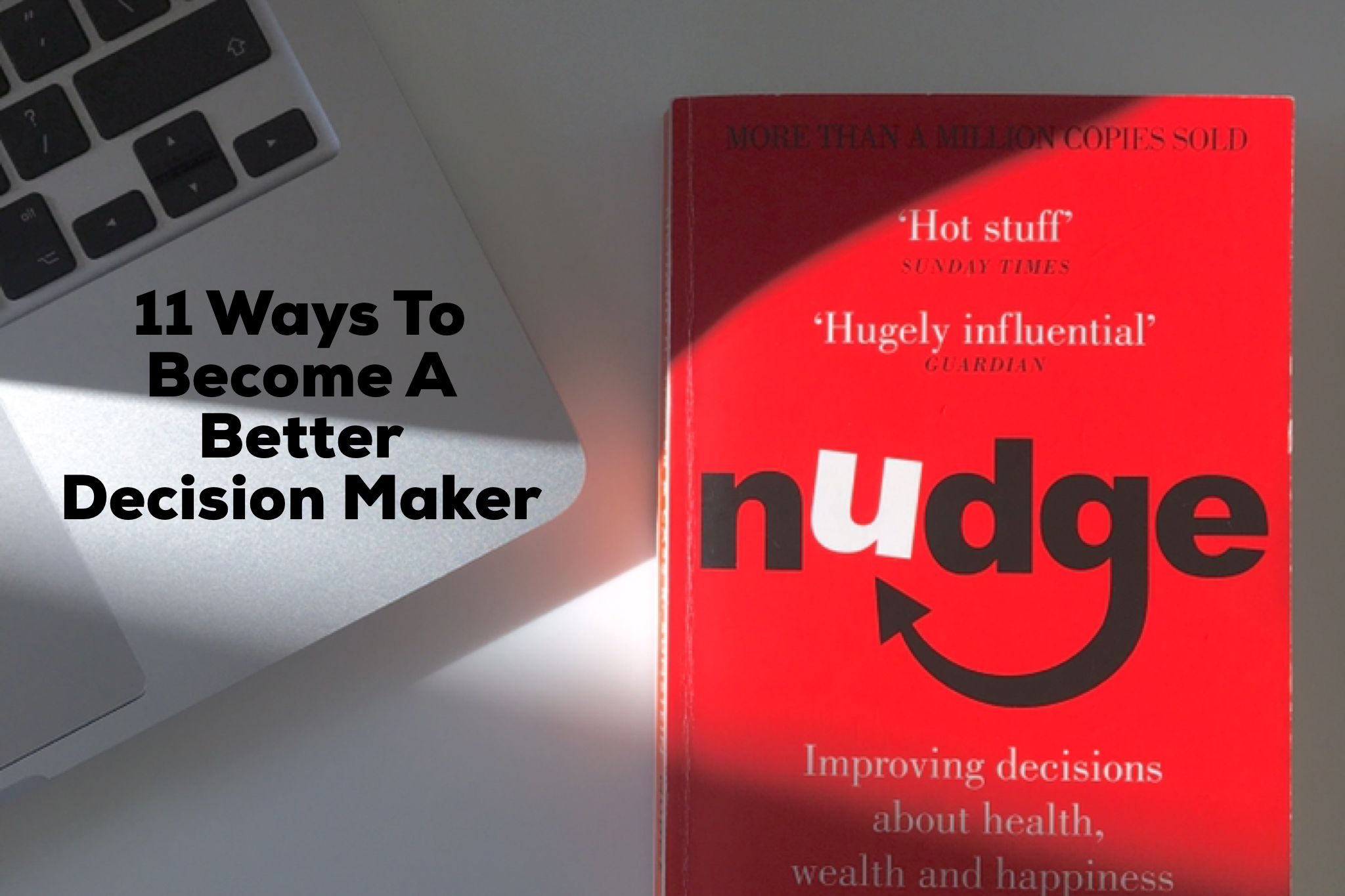The Nudge Theory - 11 Ways To Become A Better Decision Maker
After reading Nudge by Richard Thaler & Cass Sunstein, a guide on 'improving decisions about health, wealth and happiness', I definitely knew this was something I wanted to write about in a blog post to share with you. The book explores The Nudge Theory - a concept in behavioural economics which not only impacts political decision-making around the globe but it also affects us, as individuals on a daily basis - without us even realising!
This blog post is really just an insight into what I've learnt from reading this book - I could not manage to fit everything I learnt into this post so I do highly recommend reading the full book for yourself too. Rather than explaining everything in detail, I thought it would be best to outline some of the ideas that resonated with me and hopefully, this will help trigger some new ideas for yourself. Let me know your thoughts!
A Few Definitions
The Nudge Theory:
The idea that people's behaviour can be altered in a predictable way without forbidding any options or significantly changing their economic incentives. Small suggestions and positive reinforcements are popular ways in which an individual can be 'nudged' to make a certain decision.
Libertarian Paternalism:
The idea of how policy-makers (or any influencer) allow people to have complete freedom of choice but use good choice architecture to influence their behaviour in order to positively impact peoples lives.
Choice Architecture:
The practice of influencing choice by changing the manner in which options are presented to people.
Key Lessons
1. Learn to differentiate between our mind's automatic and reflective systems.
Your automatic system is activated when you are making a decision similar to others you have made in the past. Therefore, making it quicker for you to make a sound judgement/use your instincts in these scenarios. The reflective system is much slower at decision-making and is what we use to make decisions about something much more unfamiliar. We take longer to make decisions because we reflect on the 'what-if's' before settling on a decision. The more decisions we make in a particular area, the sooner we will advance from using our reflective systems to using the automatic system. A great example of this is a learner driver. Starting to drive depends upon the reflective system, but after practice, learners progress to use the automatic system.
2. Representation largely affects how important an issue is seen to be.
Something we see in the media all the time. News that gets more media attention automatically triggers us to believe its much more important than issues that do not receive the same amount of attention. In reality, this is not always true. Many important news stories go unheard of because of the lack of representation and the idea that news 'at home' which is more likely to affect us is much more worthy of headlines than tragedies in other areas of the world.
3. The Spotlight Effect - You always think people are paying more attention to you than they actually are.
The spotlight effect plays a big part in our lives and the decisions we make. How many times have we said no to something because we 'don't want everyone to stare at us'? I know I'm guilty of this too but knowing this is, in most cases, a psychological misconception, we should stop worrying about being under the non-existent spotlight!
4. Collective Conservatism - A tendency for groups to stick to established patterns even as new needs arise.
This makes decision-making more stressful than it should be. By not consciously making a decision and siding with 'the norm', it becomes one of the most inefficient ways for a society to evolve. In the digital era where everything is evolving 100x quicker than half a century ago, we need to be much more adaptable to our environments but also own the decisions we make - even if it goes against the norm. Collective conservatism is largely seen in cultures where traditions are strongly held onto despite them being very outdated in today's world.
5. Small interventions and even coincidences, at a key stage, can produce large variations in the outcome.
We should seek value in the quality and productivity of our work as opposed to how much time we spend on a task. The smallest and quickest of decisions can have a huge impact on you, your business or the economy. One second and one choice can change your whole life!
6. Channel Factors - Ask people what they intend to do and then ask them when and how they plan to do it.
Hold your friends accountable for their goals and let them hold you accountable for yours! It's easy to share an idea but when you actually discuss the steps of materialising that idea, people are forced to think about their plan of action and find ways to navigate across potential roadblocks too.
7. Self-control issues arise when choices and their consequences are separated in time. Investment goods vs Sinful goods
A problem pretty much all of us face. The balance between short term pleasure and long term satisfaction is personal to everyone but it all comes down to patience and willpower. Living in the digital era, Gen Z is synonymous with needing 'instant gratification' and are predicted to have more self-control issues in comparison to older generations, especially the baby-boomers. Training your mind to be forward-thinking will be a great help in managing your finances in the long-term.
8. Decision making gets easier with practice but difficult life decisions do not present frequent opportunity to perfect decisions.
It's easier to decide what you want to cook for dinner than make decisions around the topics of careers, marriage, buying property etc. (Not for everyone, but a large majority).
9. Default options are powerful - they dictate to others what is seen as the 'norm' and often make people think it is the more popular choice/results in better consequences. Required choice vs Mandated choice.
How many times have you filled in an online form to see a pre-checked tick box? Out of these instances, how many times have you been unsure of what to choose and just left the box checked instead of doing some further research? If the answer is 'So many times!' & 'Omg, me!' then congratulations, you have been nudged. The pre-checked tick boxes aren't guaranteed to be the best option for you but it's what the person on the other side think you should tick to make themselves better off. Default options can appear when you're browsing for holidays or even online shopping. In future, be careful you're not nudged into the wrong decision!
10. Use RECAP to help map decisions. Record Evaluate Compare Alternative Prices
Decisions which involve gaining or losing money are what people see to be the most difficult which is why this handy acronym can help you save your £. In most cases, you are happier when you gain money rather than lose it. Impulse buying is the #1 way to waste your money so make sure you RECAP any big purchases you make!
11. Big Data - Too much data is confusing and makes the decision-making process harder. More need for nudges.
Data is everywhere and everyone wants it. What is the point in anything if you can't look at historical data to identify trends and then make forecasts way into the future? It's no lie that the infusion of data into the world economy has helped us develop in so many ways however, is all this data really necessary? Do we have too much data for some of the small day-to-day decisions we need to make? The idea of having masses of data available to many companies and not using it/forcing yourself to use it in some way has left businesses spending too much time making a decision that could have been made effectively without needing all that data in the first place. It's the perfect opportunity for some nudges!
Purchase your own copy of The Nudge Theory here, available in audiobook, paperback and kindle formats.
Kavita K xo
If you enjoyed this post then don't forget to subscribe to receive my future posts straight to your email inbox. Follow me on Instagram/Twitter to see what I'm up to before my next post!












